Play Split here before reading.
Overview
In Split, you play a college student whose mom has just undergone a minor surgery.
This interactive narrative communicates the difficulties of navigating an event in one’s personal life while the rest of the world (school, work, social interaction) continues as normal. It can be a lonely, isolating experience – but it’s also something that everyone deals with at some point in their lives.
This is especially applicable for a high-pressure academic environment like Stanford. Students regularly sacrifice their own well-being (sleep, health, relationships) in order to perform well in their classes. Quarters move so fast that it’s easy to fall behind and feel alone if anything happens in your personal life.
My learning goals for Split are to generate general empathy for anyone having to deal with a personal issue on top of school/work, and to have players reflect on the importance of family, health, and friends you can be vulnerable with.
Key Moments
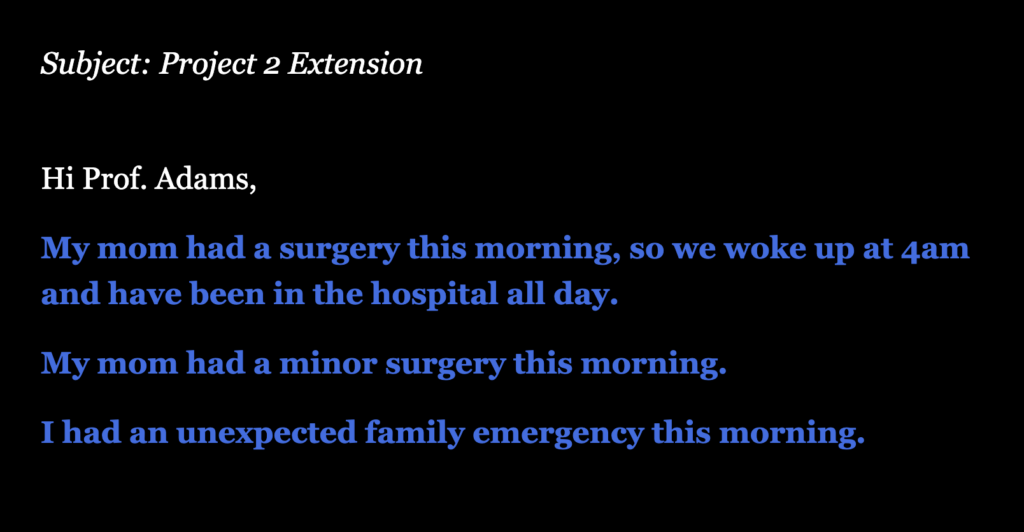
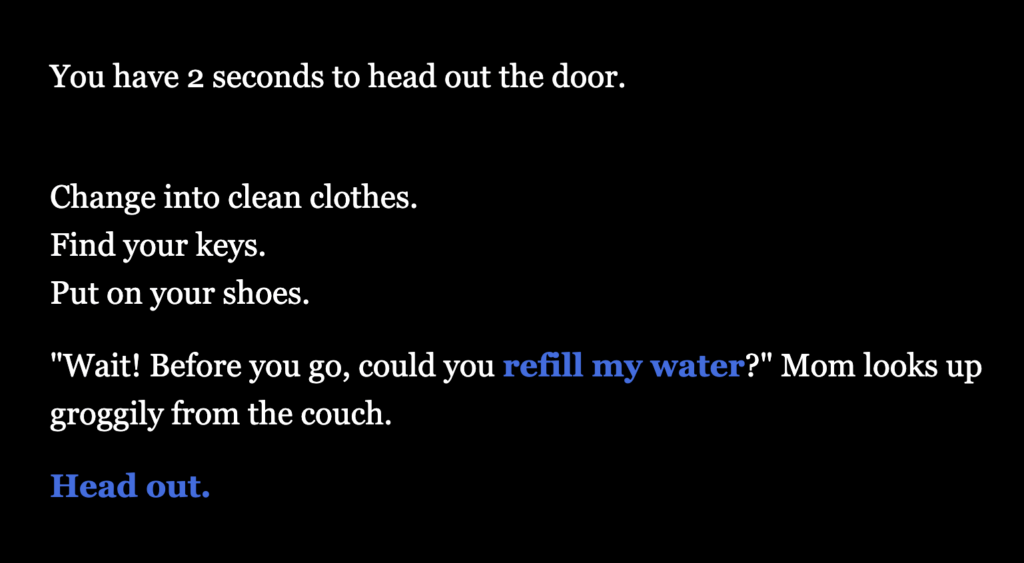
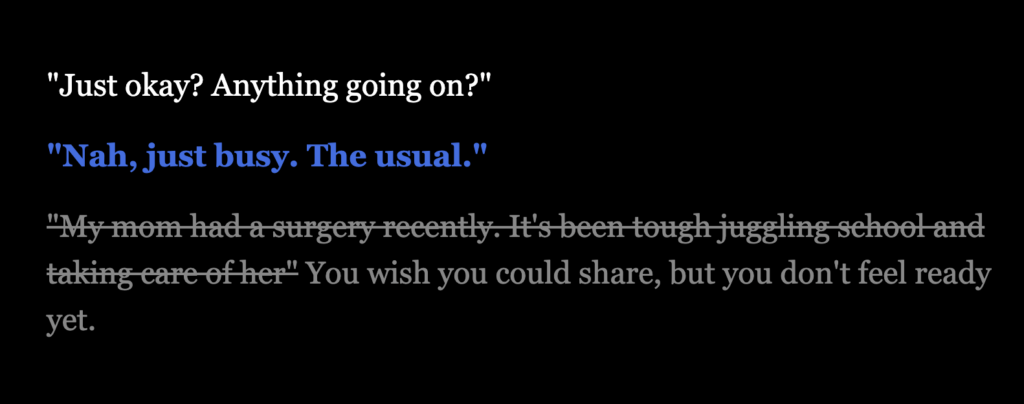
Playtest Observations and Proposed Changes
I had five playtesters from CS377G: Ada, Caroline, Kyle, Marielle, and Shana.
Playtest 1:
- thought intention was clear
- assumed that the player was someone regularly asked for extensions
- Change: added the line “You’ve always been a good student, but…” in order to establish what normal behavior looks like for the player. This better communicates how much the surgery has impacted them.
- suggested slowing down the pace to make it feel more realistic
- Change: added some timing effects to slow down decision making, decided to focus on adding detail to one day instead of many
Playtest 2:
- understood intention
- suggested building the anxiety of decision making even more
- Change: broke down the email even more so that every line requires a decision.
Playtest 3:
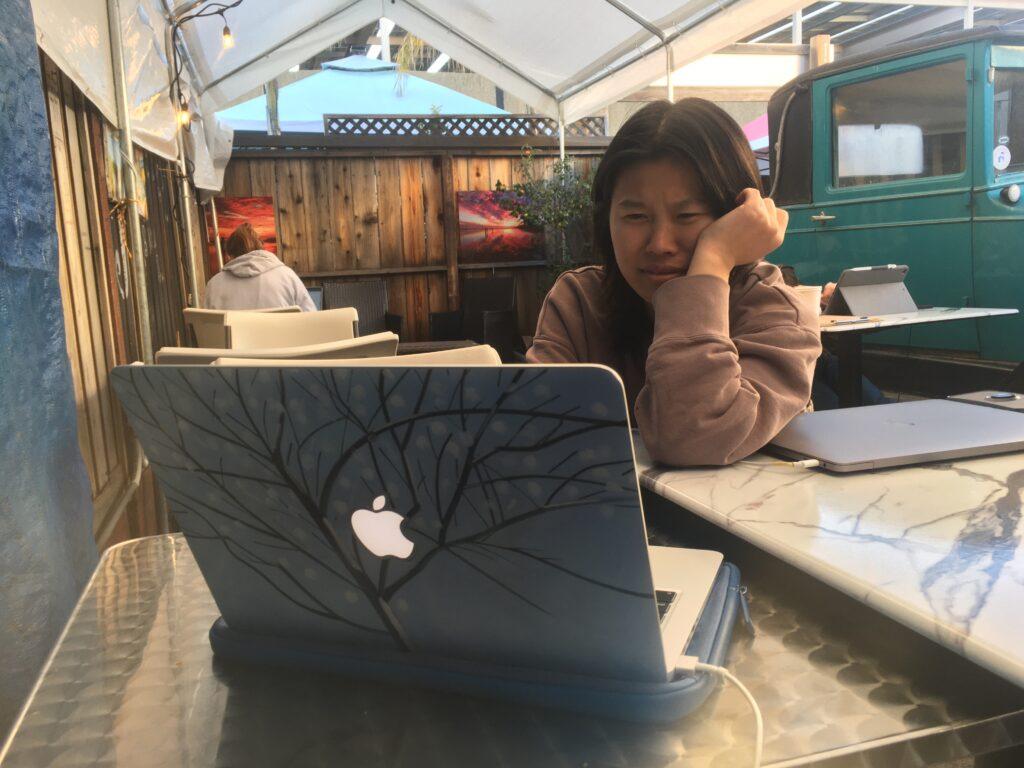
- really liked the broken-down email: “this is just like what I do!”
- Change: took suggestion to break it down even further and include Dear vs Hello vs Hi, Professor vs Prof vs Maria.
- thought a timer might add interesting pressure to the decision-making
- Change: created a countdown timer for getting out the house
Playtest 4:
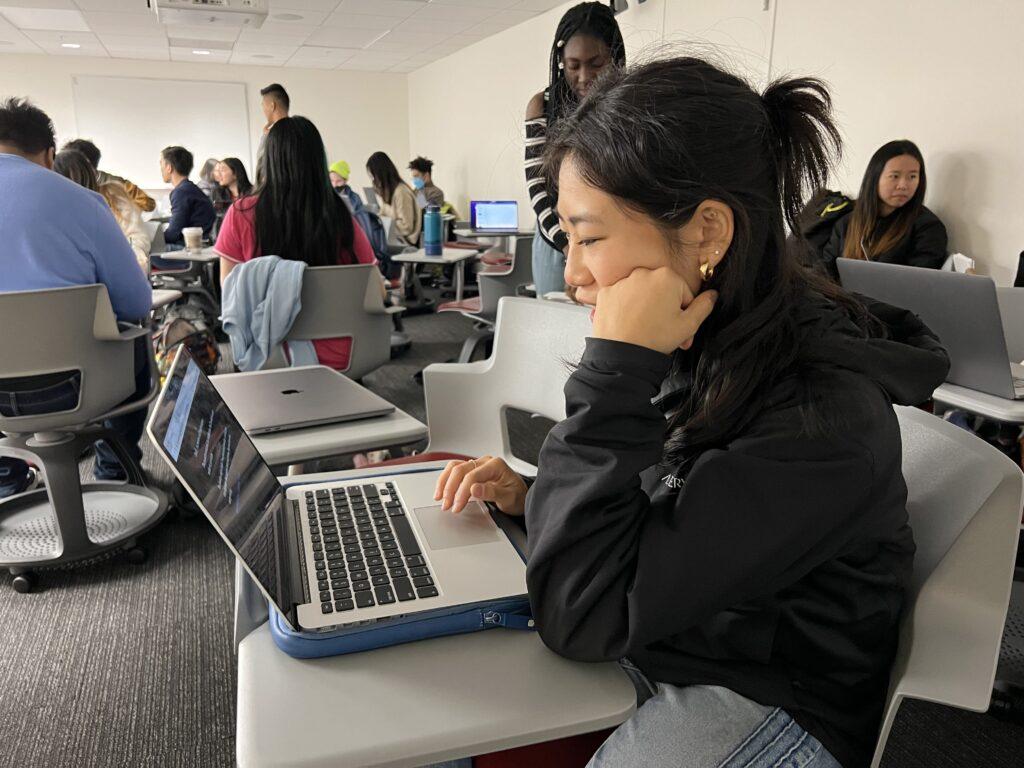
- in addition to the main intention, also thought it was about family (made her miss her parents) and the burden of taking care of someone (made her thankful to have a sister to help take care of her parents)
-
- Change: I liked these additional connections and wanted to make it more obvious! I made the mom seem more tired, emphasized the responsibility of being the only child, and also made the relationship between the mom and player feel tight-knit (helping mom put on fuzzy socks). The mom was a little too cheery originally:

- filled out the email quickly based on personal preferences (not from the player’s perspective)
- Change: added more internal dialogue and conflict before choices to make them feel difficult and help them get in the player’s head.
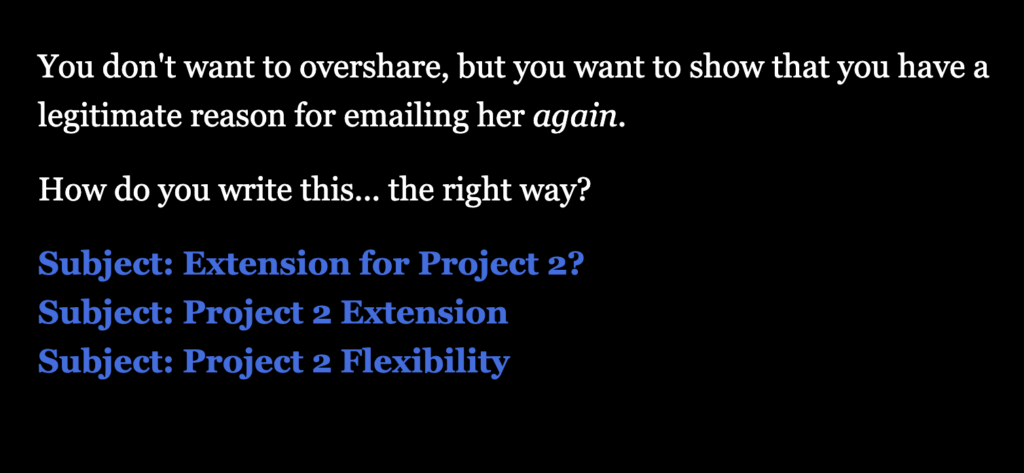
- wanted a clearer feeling of progress made over time
- Change: added a progress bar to show how your well-being progresses whenever you help your mom out. when your well-being is high enough, you can unlock new choices in the classroom scene (share more about your personal situation).
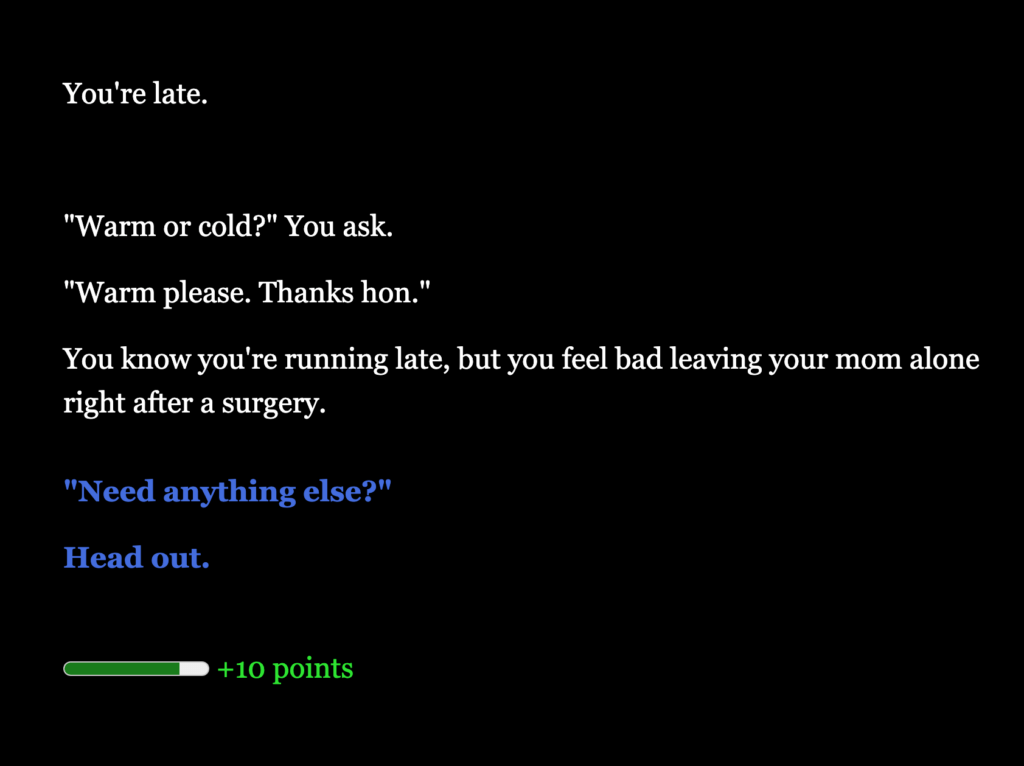
Playtest 5:
- thought it was about navigating school and personal life
- “You nailed the message”
- liked the heavily choice-based sections (email and heading out of the house) and seemed to feel invested in the decisions
- “Ohh I do this all the time” (overthinking emails)
- “I’ve got to give my mom the socks!”
- gave feedback on timing
- Change: made timers a bit faster, got rid of the timer for this line:
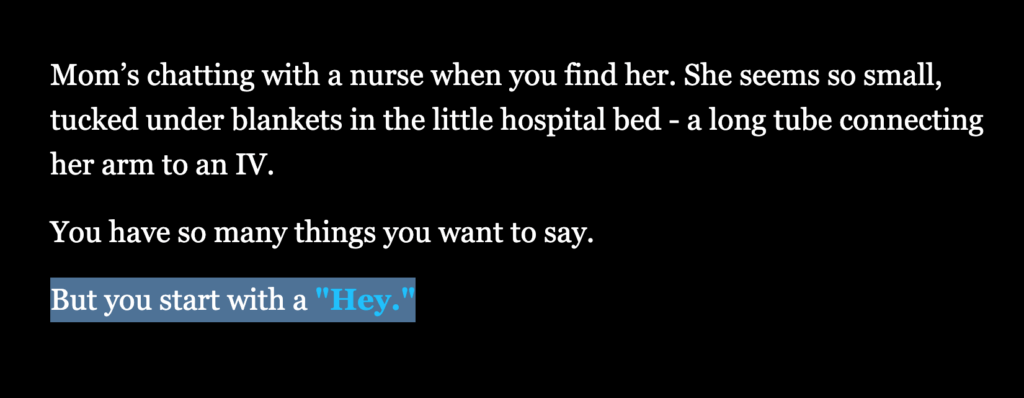
- did not like the points bar. thought the overall game felt very real and that the points cheapened the effect
- Change: removed points and ended story earlier
Playtest 6:
- really liked the countdown for heading out
- “Oh!! I love this. This is scary”
- paused for a good 5 seconds here, trying to decide whether to go. I’m glad the decisions are tough now
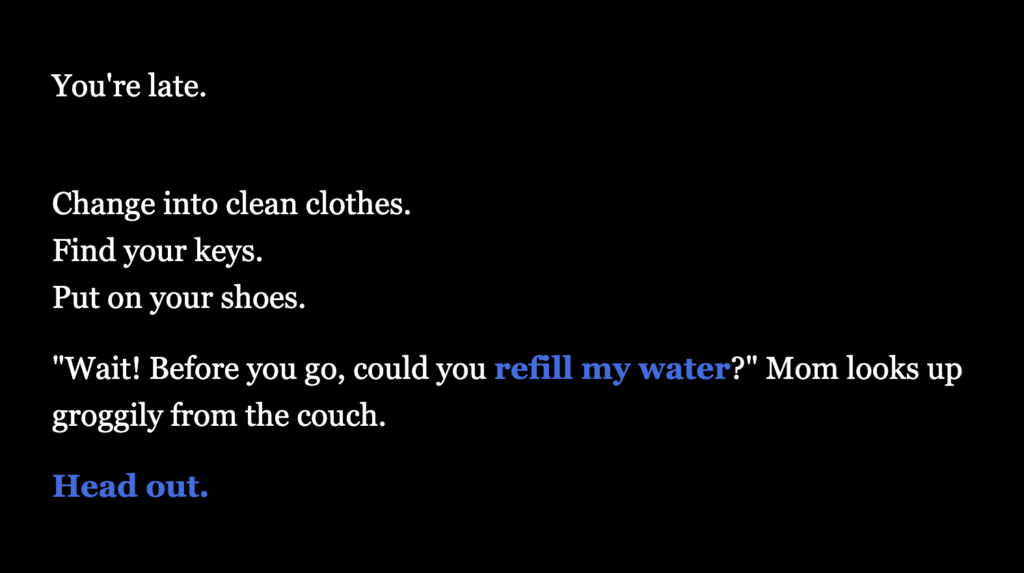
Reflection
I can’t remember the last time I wrote fiction, so this was quite a push for me. I spent a long time deciding what to write about and feeling stuck – but I’m decently pleased with what I ended up with.
I am still learning to be okay with “shitty first drafts” when I write. I know that I’ll be able to put so much more down on paper if I just sit down and let it all out (instead of my current process which involves a lot of thinking in my own head and rewriting lines as I go). In the future, I think it might be better for me to write a first draft on paper – so that I feel less inclined to perfect as I go.
I also learned a lot from playtesting and am curious what it’d be like to playtest other forms of writing. Usually, if I want feedback on an essay or personal statement, I’ll wait until I have a completed draft – but this process has helped me see how early feedback can shape your whole direction and even influence the message you want to get across.



This game demonstrates the values of commitment to family and commitment to working hard academically. It becomes a challenge for the protagonist to balance both of these values as well as a need to take care of themselves. One scene that conveys this in particular is when the player has 10 seconds to try to prepare all the things they need to get ready for school, and then can choose to check in with their mother who is recovering from surgery. However, taking the time for this check in will make them late to their class.
Moments like this created a strong sense of empathy for the character. It also reminded me of the importance of taking care of yourself so that you can better care for others. I think this goal could be amplified if the game showed a moment where the player faces more explicitly personal consequences for spending too much energy on school or family care.
The game’s medium was a good fit for this story, as the experience focused on making choices between conflicting needs. For instance, the game prompts you to make choices about the particular language to use in an email asking for an extension from a professor. I love this part because it mirrors the dilemmas I face when writing these types of emails – every word seems to matter when you are unsure what the response might be. Though these choices seem small, the game did a great job of showing how significant they can feel.
Overall, the story is compelling and well written, but the ending left me wanting more. I think the story would benefit from a final culminating dilemma, that might result in different possible endings.
I truly see the struggle of balancing taking care of family and doing well in ones’ own life. The feeling of isolation and the hesitation and fear we feel when we try to be vulnerable is really well conveyed through the game mechanics. I especially likes the usage of the time features in Twine where you can fell the pauses in between sentences and the time pressure you need to get everything done. The story is extremely relatable, and it reads like a slice of my life.
I also think the author broke the tradition of “meaningful choice” purposefully to illustrate what it feels like to overthink and getting paralyzed in all the small choices we have to make everyday. Overall, I really like the atmosphere this game offers and the struggles it illustrates. One thing I would really want to see is what happens when the main character decides to finally open up and try to not bottle everything up, because I think that gives a sense of hope and would encourage people to be more open and vulnerable with each other 🙂
Overall, I really related to this story! It touched me personally, as I know I would help my family in any way possible, at times at my own costs. Given that I relate to this story, it was clear from the start that it would revolve around empathy for students/anyone who feels the pressure of juggling academic/career stress on top of personal situations. The characterization of the protagonist was the main element that established this, as well as the themes of family and friends. The deliberate use of time, both in the countdown as well as the text that was released gradually over time, really helped me feel rushed or contemplative where necessary. I think those elements further enhanced my attachment to the story. These touches were a really good use of Twine! My choices did feel very important, as I personally wanted to care for the mother, while still trying to be eloquent and orderly with the professor (in the email) despite all the stress in the protagonist’s life. I wanted the best for everyone, and when the story dashed out my opportunity to tell the truth to the friend, I resonated with it. It was a deliberate choice that mirrored how I feel when I can’t quite say what’s really going on.
I thought the use of time/delay and interrupting/dashing out choices was unique! I really enjoyed those surprises and what they added to the experience. I do wonder if there is a way to add any feedback to the player regarding how they worded their email. It can help reinforce the reality of these situations, where some educators might be empathetic, while others won’t be. Amazing job!
This was exquisite. You used the medium brilliantly. I particularly liked the way choices became no choice at all. This is really a tremendous work, and I hope you keep writing in any medium.